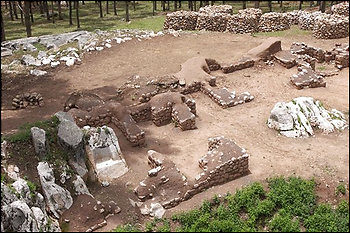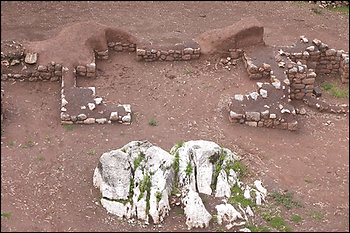

(above) In these photos released by Andina Agency, the ruins of a newly disovered temple are seen at the Sacsayhuaman archeological ruins in Cuzco, Peru, in this recent undated photo. Archaeologists in Peru have discovered the ruins of an ancient temple, roadway and irrigation systems at a famed fortress overlooking the Inca capital of Cuzco, officials involved with the dig said Thursday. (AP Photo/Andina Agency) (Andina Agency - AP)
Pre-Inca Temple Discovered in Peru
Friday, March 14, 2008 - Washington Post - AP
By ANDREW WHALEN The Associated Press
LIMA, Peru -- Archaeologists have discovered the ruins of an ancient temple, roadway and irrigation systems at a famed fortress overlooking the Inca capital of Cuzco, according to officials involved with the dig.
The temple on the periphery of the Sacsayhuaman fortress casts added light on pre-Inca cultures of Peru, showing that the site had religious as well as military aims, according to researchers.
It includes 11 rooms thought to have held mummies and idols, lead archaeologist Oscar Rodriguez told The Associated Press.
The team of archaeologists that made the discoveries believes the structures predated the Inca empire but were then significantly developed and expanded.
"It's from both the Inca and pre-Inca cultures; it has a sequence," Washington Camacho, director of the Sacsayhuaman Archaeological Park, told the AP on Thursday. "The Incas entered and changed the form of the temple, as it initially had a more rustic architecture."
Archaeologists are still waiting for carbon dating tests, but Camacho said their calculations about the facilities' age are supported by historical references such as ceramics and construction style.
Previous carbon-14 dating of Sacsayhuaman revealed that the Killke culture constructed the fortress in the 1100s, said Peruvian archaeologist Luis Lumbreras, former director of Peru's National Culture Institute and an expert on Cuzco's pre-Incan cultures. He was not involved in the dig.
The Killke occupied the region from 900 to 1200 A.D., prior to the arrival of the Incas.
"These recent discoveries add to our knowledge of Sacsayhuaman, confirming again the aggregate nature of the fortress," Lumbreras told The Associated Press.
The Inca empire, based in the ancient city of Cuzco, flourished along the western edge of South America during the 1400s, prior to the arrival of the Spanish.
Today, Cuzco is Peru's main tourism hub and a launching point for visitors to the jungle-shrouded ruins of Machu Picchu, 40 miles northwest.
The temple lies a little under a mile from zigzagging walls of the Sacsayhuaman fortress, alongside an enormous rock formation believed to be one of the fortress' burial mounds.
"The temple is one of the most important in the Sacsayhuaman site," Camacho said.
The discovery of the temple reveals "the sacred ceremonial nature of the Killke," Lumbreras said. "Previously we thought Sacsayhuaman was simply a military fortification, but we now see it was a very complex ceremonial center.
Lumbreras, now working with Peru's Institute for the Study of Cultural Patrimony, has extensively studied and excavated sites from the Wari culture, which flourished in Peru's southern highlands from 500 to 1200 A.D.
Part of the temple was destroyed by dynamite blasts in the early 20th century, when the site was used as a stone quarry.
The roadway, buried for hundreds of years under about three feet of soil, is believed to have formed part of a network connecting Sacsayhuaman's buildings, according to Camacho.
Archaeologists are also busy unearthing an advanced hydraulic system, which may have been used to supply water to Cuzco during the Inca empire.
The team also believes the Killke built the irrigation system, later used and expanded by the Incas. Remnants of Killke ceramics are scattered throughout the site.
The new excavations, directed by Cuzco's National Culture Institute, began in June 2007 and will continue for another five years, Camacho said.
___
Associated Press writer Fernando Zora-Carvajal contributed to this report from Cuzco.